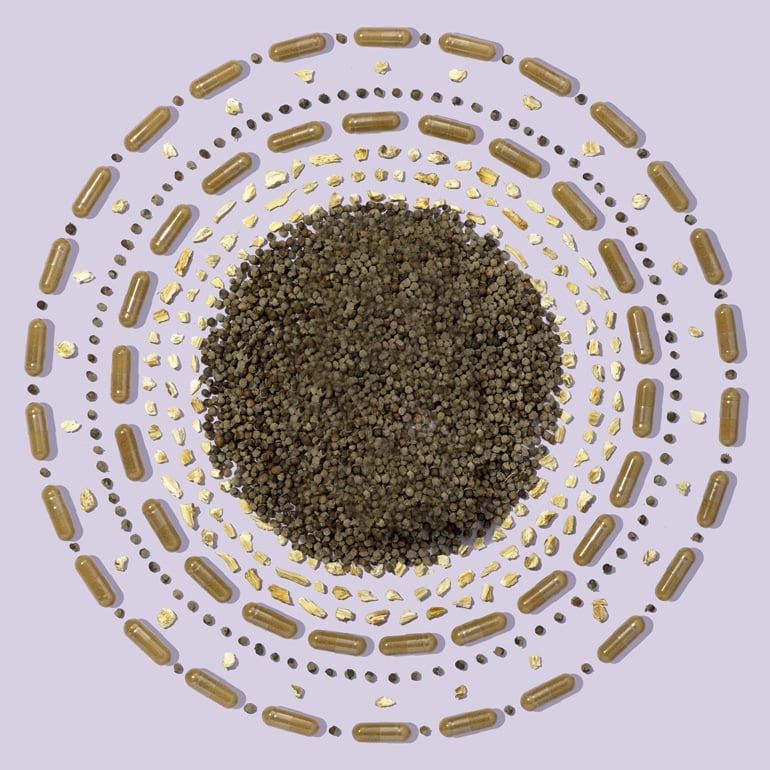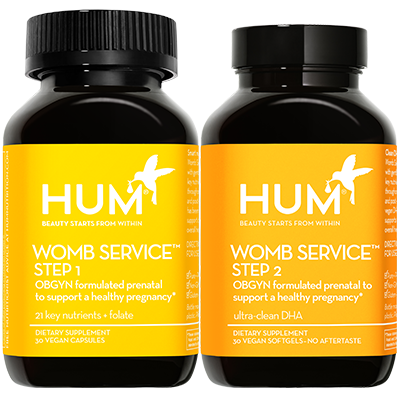Does Taking Vitex for Fertility Actually Work?
If you’re struggling to get pregnant, should you take vitex for fertility? See what studies and medical experts have to say.
Whether you’re planning to get pregnant or actively TTC (trying to conceive), you may have heard about taking vitex for fertility. Vitex, aka chasteberry, is key to hormonal and reproductive health for several reasons. First, the native Mediterranean herb has been used across different cultures for centuries to promote female hormonal balance. Second, vitex is one of the best natural remedies to help alleviate PMS symptoms. (Yes, that’s right, you can use chasteberry to tame painful period cramps, headaches, and even hormonal acne). It also may help combat symptoms during menopause like vaginal dryness and hot flashes.
Given its power to improve so many facets of hormonal health, you might be curious as to whether vitex influences pregnancy. How does vitex increase fertility, exactly? We looked into the scientific literature behind taking vitex for fertility and hormonal balance. Plus: three doctors who specialize in women’s health weigh in on the connection between vitex and fertility.

How Vitex Impacts Pregnancy Hormones
There are a few different way in which the herb impacts hormones specific to pregnancy, which may increase chances of getting pregnant.
Prolactin
Vitex impacts prolactin (PRL), a hormone produced in the pituitary gland whose primary functions involve prepping the body for pregnancy and producing breast milk. People who have shorter luteal phases (the second half of the menstrual cycle) have highly-elevated prolactin levels. This imbalance poses a challenge to people trying to get pregnant. That’s because high prolactin levels interfere with the production of other hormones (like estrogen and progesterone), which can change or even stop ovulation, according to the American Society for Reproductive Medicine. It can also lead to irregular or missed periods, which can make planning for conception more difficult.
When you’re trying to conceive, a doctor may run a prolactin test to see if your prolactin levels might be impacting fertility. For reference, the Pituitary Network Association states that normal prolactin levels for women are less than 20 ng/ml. Since vitex can lower prolactin levels in your body, it can be helpful for those who have elevated levels and are struggling to get pregnant to take a supplement.
Progesterone and Estrogen
Vitex also impacts progesterone, a sex hormone integral to the menstrual cycle and to pregnancy. “Progesterone is the hormone of feeling relaxed and stress-free,” says Dominique Fradin-Read, MD, MPH, Founder of VitaLifeMD in Los Angeles. “Vitex reduces the production of the follicle-stimulating hormone (FSH) while supporting the luteinizing hormone (LH).” In turn, these processes increase progesterone levels, which lengthens the luteal phase. While the best chances of conception happen in the follicular phase (the first half of your menstrual cycle), it can also happen during the luteal phase—which is why taking vitex can be helpful.
What about estrogen? A 2017 systematic review suggests that vitex can bind to estrogen receptors, influencing estrogen activity. The balance of the hormones estrogen and progesterone can help regulate your menstrual cycle, which can also be helpful when trying to conceive. Because vitex can help balance the levels of progesterone and estrogen in your body, it can increase the chances of getting pregnant. That’s because conception is dependent on a balanced reproductive system. In fact, a 2015 article states that without both the follicular (first half) and luteal phases of the menstrual cycle working in series, natural reproduction is not possible.
Studies on Taking Vitex for Fertility
Findings on Vitex, Prolactin, and Progesterone
A 1993 randomized double-blind study tested the efficacy of 20 milligrams of a vitex supplement, compared to a placebo group, involving 52 women.
Within three months, researchers measured lower prolactin levels, more normalized luteal phases, and elimination of issues with luteal phase progesterone synthesis in the vitex supplement group. All of these results indicate that taking vitex for fertility can improve conditions within the reproductive system to encourage pregnancy.
Additionally, a 2014 study on using vitex as an herbal treatment for PCOS found that it could potentially help regulate irregular menstrual cycles (therefore stimulating ovulation). The hormonal outcomes of the research included balancing luteinizing hormone and prolactin, which assisted with cycle regulation.
Findings on Vitex for Conception
A 2006 double-blind placebo-controlled study tested the impact of a vitex supplement—which also included a proprietary blend of other vitamins and minerals—involving 93 women who experienced recent difficulty getting pregnant.
The first question the study looked to answer: How long does it take for vitex to work for fertility? Within three months, the group taking vitex for fertility showed better hormonal balance. Further, 26 percent of these women became pregnant, while only 10 percent of those in the placebo group did.
Another recent study involving women taking vitex in conjunction with maca and folate (a key ingredient in prenatal vitamins) resulted in a pregnancy rate of 37 percent. The number of women who ovulated increased from 10 percent to 42.9 percent by the end of the study. (Psst: If you’re looking for a prenatal vitamin, HUM’s Womb Service is RD- and OBGYN-formulated, and contains all the essential nutrients for every stage of pregnancy.
How to Take Vitex for Fertility
While these results seem to show positive correlations between vitex and fertility, there are some important considerations when taking vitex for fertility. LA-based OB-GYN and integrative women’s health expert Suzanne Gilberg-Lenz, MD, FACOG voices an important point regarding studies behind herbal meds: “They always use smaller samples than conventional pharmaceuticals, and therefore they draw less powerful conclusions.”

Are There Any Side Effects of Vitex?
In general, vitex is safe for most people to take. The side effects of vitex can include acne, stomach issues, dizziness, nausea, itching, or heavier menstrual bleeding, says Leena Guptha, PhD, ND, DO, Academic Dean of Online Education at Pacific College of Health and Science. If you have certain hormone-sensitive conditions including a history of breast, ovarian, or uterine cancers, you should probably not take vitex. “Because chasteberry can alter progesterone and possibly estrogen levels in your body, people with hormone-related conditions such as breast cancer should not use chasteberry,” Dr. Guptha adds. As always, it’s best to consult your doctor about any supplements you want to take while trying to get pregnant.
So, Does Vitex Help Fertility?
Simply put, taking a vitex supplement for fertility has potential—but with caveats.
Still, Dr. Gilberg-Lenz still recommends vitex to promote general hormonal balance for some patients. She says, “the evidence seems fairly strong for using vitex for PMS and PMDD. I’ve also used, with some success, vitex for PCOS and other menstrual disorders.”
By addressing menstrual concerns first, she believes that vitex “can consequently restore or increase fertility in a well-selected population.” However, she says its impact depends on the cause of the specific fertility problem at hand. Despite the use of vitex in her medical practice, she reminds us that her experience is anecdotal and shouldn’t be regarded as evidence-based.
Dr. Fradin-Read concurs that infertility results from various hormonal imbalances. Because of this, she sees the potential for vitex to bolster the foundations of fertility.
Dr. Fradin-Read reiterates that a weak luteal phase and lack of progesterone hinder successful pregnancy. She recognizes studies such as the ones above illustrating success with vitex to increase progesterone secretion, which is essential to support implantation in the uterine lining and maintain healthy fetal development.
If you know or suspect that you have fertility issues, explore your concerns with a medical professional. This consultation is especially important before you decide to take vitex, as additional or different treatments may be necessary.
Is Taking Vitex While Pregnant Safe?
“The safety profile for vitex is very good, and adverse events have been shown to be infrequent, mild, and always reversible,” Dr. Fradin-Read says. “Still, its use in pregnancy and lactation isn’t recommended based on a lack of studies on evidence of safety.”

What to Look for in a Vitex Supplement
You can take chasteberry in a few different forms, including tinctures, capsules, or even dried chasteberry. The right dose depends on the supplement brand. For example, HUM’s Moody Bird contains 300 mg of vitex.
However, Dr. Gilberg-Lenz warns that not all nutraceuticals are created equally. To begin, “product quality is a major issue,” she says. When looking for a vitex supplement, be sure to find one from a reputable company. As with any supplement, always look for the research behind a given formulation. HUM’s products are all Clean Label Project-certified, which is awarded to products that follow the strictest criteria of showing what’s in their products (meaning they’re free of high-risk chemicals and heavy metals).
Moreover, she continues, “it’s imperative to use these products with a qualified doctor who understands both herbal and conventional medicine to avoid contraindications and conflicts.”
The Bottom Line
So, can vitex help you get pregnant? It’s hard to say with finality exactly how to take vitex to get pregnant. However, several studies and women’s health MDs suggest it can have a strong, positive impact on female hormonal balance, which can enhance the success of a healthy pregnancy. It’s worth consulting your doctor to see if supplementing with vitex while TTC (trying to conceive) can potentially ease fertility struggles.









